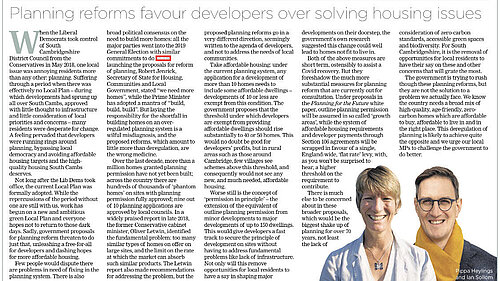Planning reforms favour developers over solving housing issues - Ian Sollom and Pippa Heylings

Lib Dem Parliamentary Spokespersons Ian Sollom (South Cambs) and Pippa Heylings (South East Cambs) on the government's proposed planning reforms, published in the Cambridge Independent on 14/10/20.
When the Liberal Democrats took control of South Cambs District Council from the Conservatives in May 2018, one local issue was annoying residents more than any other: planning. Suffering through a period when there was effectively no Local Plan – during which developments had sprung up all over South Cambs, approved with little thought to infrastructure and little consideration for local priorities and concerns – many residents were desperate for change. A feeling pervaded that developers were running rings around planning, bypassing local democracy and avoiding affordable housing targets and the high-quality housing South Cambs deserves.
Not long after the Lib Dems took office, the current Local Plan was formally adopted. While the repercussions of the period without one are still with us, work has begun on a new and ambitious green Local Plan and everyone hopes not to return to those dark days. Sadly, government proposals for planning reform threaten to do just that, unleashing a free-for-all for developers and dashing hopes for more affordable housing.
Few people would dispute there are problems in need of fixing in the planning system. There is also broad political consensus on the need to build more homes: all the major parties went into the 2019 General Election with similar commitments to do so. On launching the proposals for reform of planning, Robert Jenrick, Secretary of State for Housing, Communities and Local Government, stated “we need more homes”, while the Prime Minister has adopted a mantra of “build, build, build”. But laying the responsibility for the shortfall in building homes on an over-regulated planning system is a wilful misdiagnosis, and the proposed reforms, which amount to little more than deregulation, are the wrong medicine.
Over the last decade, more than a million homes granted planning permission have not yet been built; across the country there are hundreds of thousands of "phantom homes" on sites with planning permission fully approved; nine out of 10 planning applications are approved by local councils. In a widely praised report in late 2018, the former Conservative cabinet minister, Oliver Letwin, identified the fundamental problem: too many similar types of homes on offer on large sites, and the limit on the rate at which the market can absorb such similar products. The Letwin report also made recommendations for addressing the problem, but the proposed planning reforms go in a very different direction, seemingly written to the agenda of developers, and not to address the needs of local communities.
Take affordable housing: under the current planning system, any application for a development of more than ten homes needs to include some affordable dwellings – developments of 10 or fewer are exempt from this condition. The government proposes that the threshold under which developers are exempt from providing affordable dwellings should rise substantially to 40 or 50 homes. This would no doubt be good for developers’ profits, but in rural areas such as those around Cambridge, few villages see schemes above this threshold, and consequently would not see any new, and much needed, affordable housing.
Worse still is the concept of "permission in principle" – the extension of the equivalent of outline planning permission from minor developments to major developments of up to 150 dwellings. This would give developers a fast track to secure the principle of development on sites without having to address fundamental problems like lack of infrastructure. Not only will this remove opportunities for local residents to have a say in shaping major developments on their doorstep, the government’s own research suggested this change could well lead to homes not fit to live in.
Both of the above measures are short term, ostensibly to assist a Covid recovery. But they foreshadow the much more substantial measures for planning reform that are currently out for consultation. Under proposals in the Planning for the Future white paper, outline planning permission will be assumed in so called “Growth Areas”, while the system of affordable housing requirements and developer payments through Section 106 agreements will be scrapped in favour of a single, England-wide, "flat rate" levy, with, as you won’t be surprised to hear, a higher threshold on the requirement to contribute.
There is much else to be concerned about in these broader proposals, which would be the biggest shake up of planning for over 70 years, not least the lack of consideration of zero-carbon standards, accessible green spaces and biodiversity. For South Cambridgeshire, it is the removal of opportunities for local residents to have their say on these and other concerns that will grate the most.
The government is trying to rush through these planning reforms, but they are not the solution to a problem we actually face. We know the country needs a broad mix of high-quality, age-friendly, zero-carbon homes which are affordable to buy, affordable to live in and in the right place. This deregulation of planning is likely to achieve quite the opposite and we urge our local MPs to challenge the government to do better.
